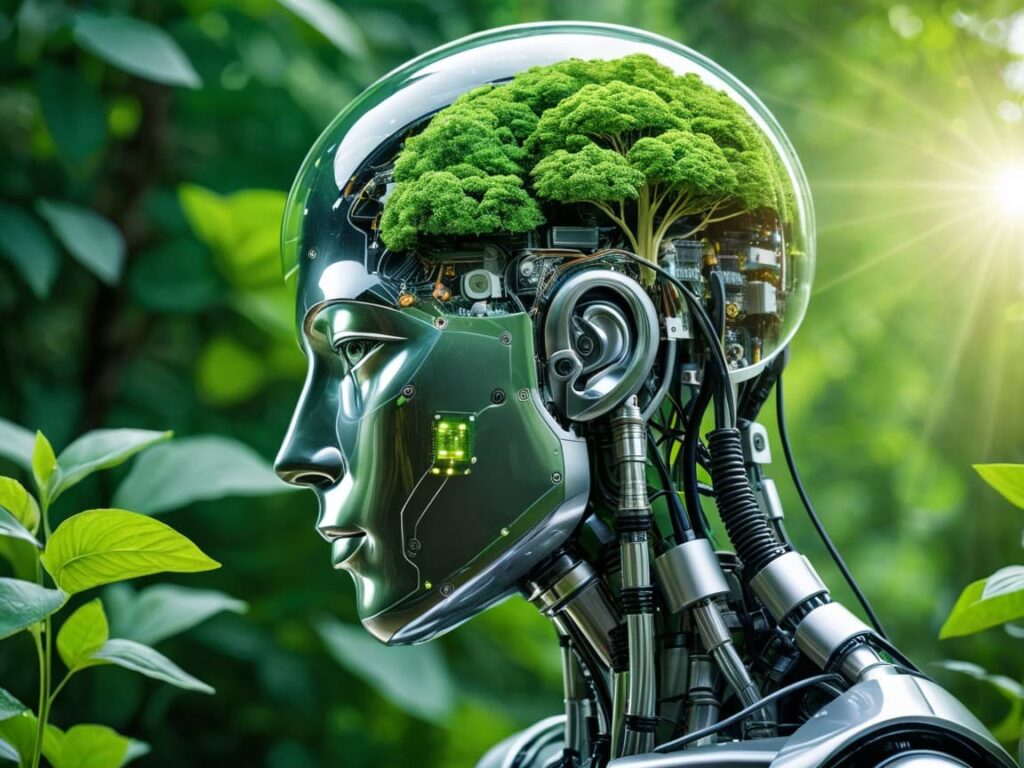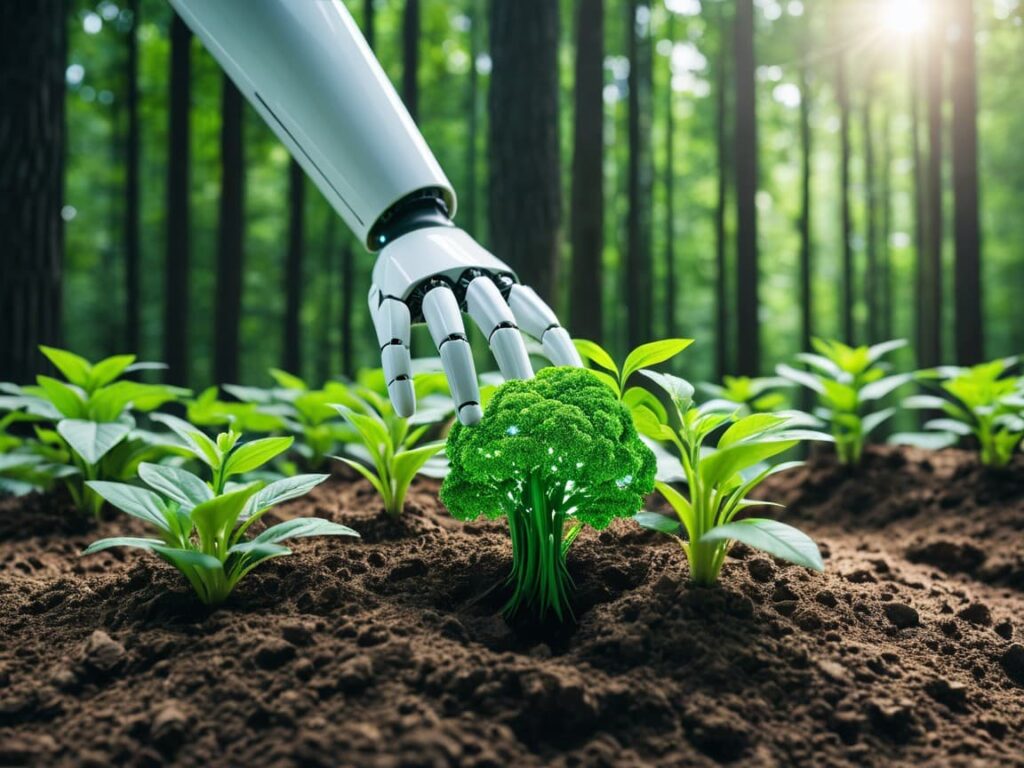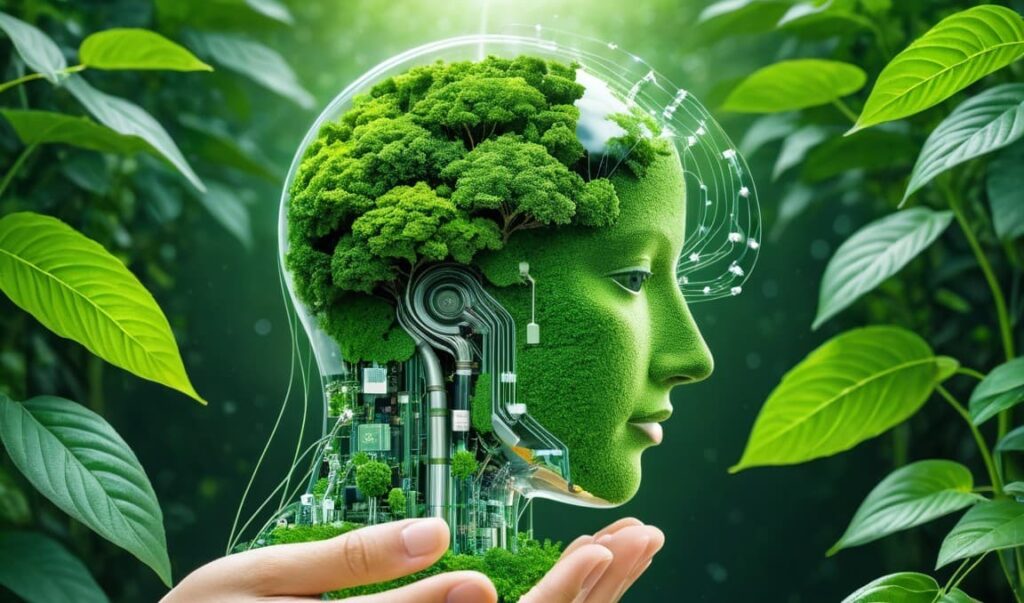
AI for sustainability (AI) is emerging as a powerful tool in reshaping how organizations approach sustainability and environmental responsibility. Whereby merging cutting edge technological innovation with ecological stewardship, Because AI is driving meaningful change in energy efficiency, waste reduction, and resource management. Therefore as businesses across the world continue to seek solutions. To reduce their environmental impact. Therefore AI is helping them optimize resources, monitor emissions, and minimize waste. While providing transparency and accountability in environmental management.
AI for Sustainability in the work force
1. Real Time Monitoring for Smarter Decision Making
AI for sustainability tools. Whereas offer real time monitoring of key environmental metrics. Therefore such as emissions, energy use, and waste production. Whereby leveraging sensors, data collection platforms, and machine learning algorithms. Therefore AI can instantly detect inefficiencies in operations and highlight areas that need improvement. Whether it’s tracking energy consumption in a factory or emissions from a fleet of vehicles. To web design or data possessing in computers. AI for sustainability enables businesses to make immediate, data driven adjustments that reduce environmental impact.
Key Benefits:
-
Instant identification of inefficiencies: AI for sustainability tools can pinpoint areas where energy is being wasted or emissions are too high. Therefore helping businesses take swift corrective actions.
-
Increased accountability: Real time data feeds allow organizations to demonstrate their commitment to environmental goals in a transparent and measurable way.

2. Optimized Processes for Sustainable Operations
Incorporating AI for sustainability tools into business processes can greatly improve logistics. Supply chain management, and manufacturing, reducing waste and saving energy. Smart algorithms can analyze historical data and operational workflows. Therefore to find the most energy efficient ways of operating. AI systems can also suggest more sustainable alternatives. Therefore, for raw materials, packaging, and transportation. Ensuring that businesses can meet sustainability targets without compromising productivity.
AI for Sustainability for logistics
Key Benefits:
-
Waste reduction: AI for sustainability tools ability to identify bottlenecks and inefficiencies in supply chains can lead to less waste in terms of materials, energy, and labor.
-
Energy savings: AI optimizes manufacturing operations by predicting energy usage and suggesting strategies for reducing consumption.
-
Smarter logistics: AI for sustainability based route optimization. Therefore ensures that transportation fleets operate more efficiently. Hence reducing fuel consumption and lowering carbon footprints.

3. Intelligent Resource Management for a Sustainable Future
AI for sustainability tools play a crucial role in helping businesses manage their resources more effectively. From a big box story and markets to small business, web design, gaming community. Therefore particularly in areas like energy, water, and raw materials. By analyzing vast amounts of data. AI can forecast future resource needs and recommend strategies to ensure sustainability over the long term. For instance, in energy management. AI for sustainability tools and systems. Therefore can predict energy demands. Suggesting ways to balance consumption with renewable energy sources. Thus reducing reliance on fossil fuels. Need more information on this or another subject. Check our Web Design Okc Blog.
AI for Sustainability in Intelligent Resource Management
Key Benefits:
-
Energy demand forecasting: AI for sustainability tools predicts when energy usage will peak. Therefore enabling organizations to adjust operations or shift to renewable energy sources during high demand periods.
-
Water optimization: AI can help reduce water waste in industries like agriculture and manufacturing by identifying areas where water can be reused or conserved.
-
Efficient resource allocation: By understanding usage patterns. AI for sustainability tools helps businesses ensure that resources are allocated in the most sustainable and cost effective manner.

4. Carbon Footprint Reduction Through Data Driven Insights
One of the most pressing environmental challenges today is reducing carbon emissions. AI is playing a pivotal role in enabling businesses to lower their carbon footprint. Whereby providing insights into where and how emissions occur across operations. AI for sustainability tools can map emissions from various departments. Facilities, and even supply chains, providing a comprehensive overview. Therefore that helps organizations identify specific areas where reductions are possible.
AI for Sustainability in Reducing Carbon Footprint
Key Benefits:
-
Precise emissions tracking: AI for sustainability tools offer highly detailed emission maps. Therefore enabling organizations to monitor emissions across multiple levels from individual products to entire supply chains.
-
Targeted actions: Based on AI insights, businesses can implement targeted strategies to reduce carbon emissions. Such as optimizing energy use or switching to cleaner technologies.
-
Regulatory compliance: AI for sustainability tools. Therefore help businesses stay on top of local and global regulations related to emissions. Whereas ensuring that they remain compliant while working to lower their environmental impact.
5.

Data Driven Decision Making for Eco Friendly Choices
AI’s predictive capabilities allow companies to make smarter, more sustainable decisions. By analyzing vast quantities of environmental data. AI can provide actionable insights that drive eco friendly choices. For example, AI for sustainability tools can forecast the environmental impact of new projects or products. Whereby helping businesses design solutions that have minimal ecological footprints from the start. It also supports decision making in industries like agriculture. Where AI models predict the best times for planting or harvesting. To maximize yield while minimizing environmental damage.
AI for Sustainability
Key Benefits:
-
Sustainability centered decisions: With predictive AI models, businesses can make data backed decisions. Therefore that prioritize sustainability without compromising on performance or profitability.
-
Cost savings: Eco friendly choices can often lead to cost reductions. Whether through lower energy bills, reduced waste disposal fees, or less resource consumption.
-
Long term environmental impact: AI for sustainability tools. When used correctly. Therefore help ensure that the long term effects of decisions are considered. Therefore aligning business strategies with broader environmental goals and commitments.

Conclusion: Role in the Future of AI for Sustainability
AI for sustainability is proving to be an invaluable asset in the quest for sustainability and environmental responsibility. By optimizing processes, reducing waste. Improving resource management, and tracking carbon emissions. AI for sustainability tools are helping businesses make smarter decisions that support both their bottom line and the planet. As AI technology continues to evolve. Its role in driving environmental responsibility will only grow. Therefore offering new and innovative ways for businesses to operate sustainably. While addressing some of the world’s most pressing environmental challenges.
As organizations strive for a greener future, AI is not just an accessory. It is an essential tool for achieving lasting environmental progress.
